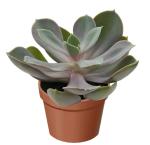|
|
AeoniumFamily: Crassulaceae.
|
|
Aeonium arboreum Webb. et Berth. |
 |
Syn. Megalonium.
Genus of about 30 species of evergreen, perennial, ocasionally biennial succulents, often subshrubby, from hillsides in Madeira, the Canary Islands, Cape Verde Islands, N, Africa, and the Mediterranean. The Aeoniums bear rosettes of leaves ranging in colour from yellow to almost black. The rosettes may be flat saucers of dencely-packed leaves or a looser arrangement on top of brunched stems. |
 |
| Growing conditions |
Watering and misting |
Propagation |
| Average warmth from spring to autumn - minimum 50F in winter.Semi-shade or bright light. Some shade in summer may be necessary. Grow in standard cactus potting mix. |
Keep compost moist at all time. In winter water very infrequently, once every 1-2 months. No need to mist the leaves. |
Cuttings root easily. Take stem cuttings, offsets or leaf cuttings in spring or summer. It is vital to let the cuttings dry for a few days before inserting in compost. Water very sparingly and do not cover with polythene or glass. Another propagation method is seed sowing - germination temperature 70-80 F. |
User-submitted additions and corrections:
Lee Mullen
Australia
24th Aug 2005
|
Aeoniums are very versatile succulent plants requiring low maintenance. They are beautiful rosetted succulents that work well with other succulents such as Aloes, Agaves, Pigface and also cacti.
They generally require full sun to partial shade. The most ornamental one to watch out for is A. 'Schwartzkopf' which has rich dark maroon foliage and bright contrasting yellow flowers.
Aeoniums are only frost hardy to around -3 Celcius and seem very tolerant of coastal and dry conditions. |
|
These materials are freely provided for instructional and educational purposes. Any duplication or publication of text or images herein for commercial gain without explicit written permission of the owner or photographer constitutes breach of trust and violation of copyright.
Copyright © Galka Okhapkina 1998-2026


